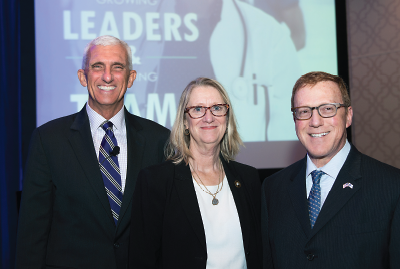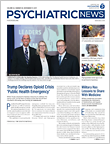Engaging and communicating with people are essential skills of leadership that should be incorporated into the leadership training of physicians.
That’s what retired Lt. Gen. Mark Hertling, former commanding general of the U.S. Army Europe and author of the 2016 book Growing Physician Leaders, told attendees in his keynote address at the Opening Session of IPS: The Mental Health Services Conference last month in New Orleans.
As commanding general of U.S. Army Europe, Hertling led over 50,000 soldiers, cared for over 100,000 family members, and partnered with the armies of 50 countries in the European theater. He was an assistant division commander in Baghdad in 2003-2004 and later commanded the Army’s 1st Armored Division in Germany and in northern Iraq during the surge. After his retirement, Hertling was appointed by President Barack Obama and served for four years as one of 25 members of the President’s Council on Fitness, Sport, and Nutrition. He is an adjunct scholar at West Point’s Modern War Institute and serves as a military analyst for CNN.
“To be a leader, you need to know yourself and know how others see you,” Hertling told meeting attendees. “To be persuasive, you need to be generating trust all the time.”
After leaving the Army in 2013, Hertling was hired as a senior vice president by Florida Hospital in Orlando to observe the culture of medicine there and help develop strategies for global partnering and leadership development. In his address at the IPS, Hertling drew on the disciplines taught in the military and codified in the Army Field Manual that emphasize the relational aspects of leadership.
“Leadership is the art of understanding motivations, influencing people, building teams, and communicating purpose in order to accomplish stated goals while improving the profession,” he said.
These are talents of leadership that call on the ability to relate to, engage with, and persuade diverse stakeholders—especially people “outside of our tribe,” Hertling said—that is, people who are outside one’s routine social circle. The culture of medicine and the education of physicians, he pointed out, have long been heavy on inculcating competence in the science of medicine, but not “in the art of engaging with people.”
He said leadership principles are distilled in a military mantra that can be absorbed by 18-year-old recruits: “Be, Know, Do”:
•
Be: What kind of person are you? How do you carry yourself? How do others see you?
•
Know: What do you know about the world?
•
Do: Competencies build trust. How do you get people to do the right thing?
Hertling said all professions are characterized by tenets that are reinforced, administered, and guarded by leaders of the profession. Those tenets include a code of ethics and a prescribed set of values that are reinforced by leaders; competence in a body of knowledge and skills possessed by none outside the profession; constant and continuous training and education in the prescribed skills and values of the profession; and prescribed standards for disciplining and dismissing fellow professionals who do not adhere to procedure, norms, and behavior.
He echoed many physician leaders in urging a return of medicine to self-governance. “You are allowing the business people to run what you do,” Hertling said. “Medicine needs physician leaders to step forward, have the courage to learn from others, and get involved.” ■

